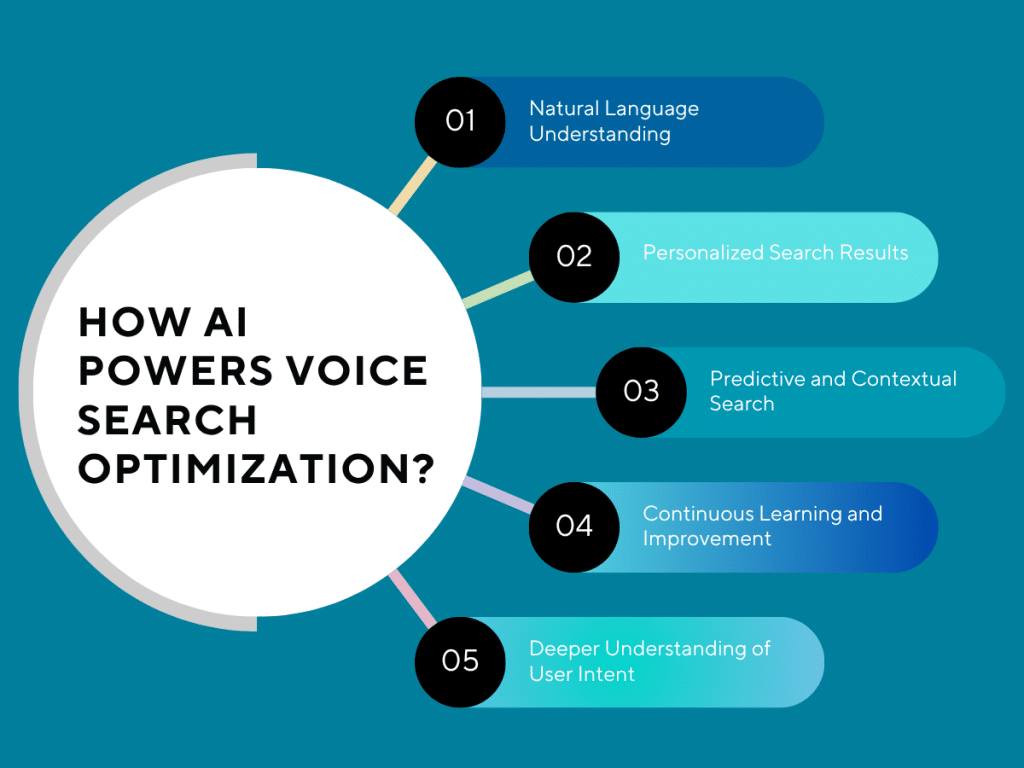The SEO world is rapidly evolving, and 2025 marks a turning point where AI and voice search are redefining how users interact with online content. From smart speakers to mobile assistants like Siri, Alexa, and Google Assistant, voice-based searches are now a daily habit for millions. Businesses that adapt to this change are seeing remarkable growth in visibility, engagement, and conversions.
This guide will describe how AI in voice search optimization is changing SEO strategies; what tools are driving these changes, and why mastering the technology is vital for your business in 2025.
Understanding the Connection Between AI and Voice Search
Artificial intelligence and voice search work hand in hand. In fact, voice recognition technology wouldn’t function effectively without the power of AI. It’s AI that allows devices to understand, process, and respond to human speech in a natural and accurate way.
At the heart of this process is Natural Language Processing (NLP), a branch of machine learning that enables computers to grasp the meaning, tone, and intent behind spoken language. For example, when someone says, “Find the best coffee shop near me,” AI doesn’t just focus on the words. It recognizes the intent behind the phrase and uses location data to deliver personalized, relevant results.
Key AI Technologies Powering Voice Search:
- Machine Learning (ML): Learns from user behavior and feedback to make voice recognition smarter and more accurate over time.
- Speech Recognition: Transforms spoken words into text so they can be processed and understood by search systems.
- Natural Language Understanding (NLU): Interprets the intent, meaning, and context behind a user’s question.
- Predictive Analytics: Anticipates what a user might want next, providing quicker and more relevant answers.
In simple terms, AI helps voice search move beyond just matching keywords. It focuses on understanding what users truly mean when they speak, creating a smoother and more natural search experience.
The Rise of Voice Search in 2025
Voice search has become one of the most significant trends shaping the digital world in 2025, and artificial intelligence is a major reason behind this growth. With AI becoming more advanced, voice technology is now faster, smarter, and more accurate than ever before.
Over 20% of searches conducted on the Google App are performed through voice search. At the same time, more than 50 percent of mobile searches are now performed using voice commands instead of typing. This shows just how quickly people are embracing the convenience of speaking to their devices.
Why Voice Search is Growing So Quickly:
- Hands-free Convenience: Users can search for information, make purchases, or get directions simply by speaking.
- Faster and More Accurate Results: AI-powered assistants process speech almost instantly and understand natural language effectively.
- Personalized Answers: Voice assistants learn from a user’s past searches and preferences to deliver more relevant results.
- Integration with Smart Devices: From smart home systems to connected cars, voice commands are becoming part of everyday life.
This growing trend highlights why businesses need to act now. Companies that optimize their content for voice search will have a clear advantage, while those that ignore it may struggle to stay visible in an AI-driven digital landscape. Voice search optimization is no longer optional, it’s becoming essential for business success in 2025 and beyond.
How AI Powers Voice Search Optimization?
Artificial intelligence is the driving force behind voice search technology. It not only supports how voice systems function but also shapes the entire process by allowing them to understand user intent, tone, and context. In 2025, AI continues to make voice search smarter, faster, and more intuitive, giving users highly accurate and personalized answers in seconds.
Here’s how AI plays a key role in voice search optimization:

1. Natural Language Understanding
AI allows search engines to handle conversational and complex queries with ease. For example, instead of focusing on short phrases like “Italian restaurant near me,” AI can accurately understand and respond to a question such as “What’s the best Italian restaurant open right now near me?” This shows how AI goes beyond recognizing keywords, it understands the meaning and context behind them.
2. Personalized Search Results
Artificial intelligence studies a user’s previous search history, location, and preferences to deliver personalized results. This means two people asking the same question might receive different answers, depending on what AI knows about their individual interests and behavior.
3. Predictive and Contextual Search
AI-powered systems use machine learning to predict what users might be looking for next. For instance, if someone often searches for healthy recipes or fitness tips, AI can prioritize related results when they ask about “morning routines” or “meal ideas.” This predictive ability makes voice search faster and more relevant.
4. Continuous Learning and Improvement
Advanced AI models like Google’s BERT and MUM continuously learn from user interactions. Over time, they become better at understanding natural speech patterns, accents, and even the intent behind questions. This constant learning process helps voice search results become more accurate and context-aware.
5. Deeper Understanding of User Intent
AI doesn’t just recognize the words people speak, it identifies the reason behind their queries. Whether someone is looking for information, directions, or to make a purchase, AI determines their purpose and delivers the most suitable response. This ensures that your content is shown to the right audience at the right time.
In short, artificial intelligence transforms voice search into a highly intelligent system that understands humans the way we naturally speak, helping businesses connect with users more effectively than ever before.
Benefits of Using AI in Voice Search Optimization
Adding artificial intelligence to your SEO and voice search strategy offers a wide range of benefits that can help your business stay competitive and visible in 2025. AI not only improves how users find your content but also enhances the overall quality and accuracy of search results.
Here are some of the top benefits of using AI in voice search optimization:
Improved Accuracy and Relevance: AI makes voice search more precise by understanding the meaning and intent behind user queries. It ensures people receive accurate answers, especially for detailed or local searches such as “best coffee shop open now” or “plumber nearby.” This accuracy helps your business appear in more relevant search results.
Enhanced User Experience: Artificial intelligence helps create smoother and faster user experiences. It allows people to get quick, conversational responses that sound natural and human-like. This makes searching more enjoyable and keeps users engaged with your content or brand for longer periods.
Boosted Local SEO Performance: Local searches are a major part of voice search today. When users say things like “dentist near me” or “best pizza delivery nearby,” AI ensures your business shows up in those results. It analyzes location data and user intent to improve your local visibility and attract nearby customers.
Data-Driven Insights: AI tools collect and analyze how people interact with voice searches. These insights reveal what users commonly ask, which pages lead to conversions, and how they engage with your content. You can use this valuable information to fine-tune your SEO strategy and create content that better matches what your audience wants.
Automation and Efficiency: AI simplifies and automates many time-consuming SEO tasks. From keyword grouping and content optimization to tracking website performance, AI handles these processes efficiently. This not only saves time but also allows businesses to focus on more strategic aspects of marketing and content creation.
Competitive Edge: Businesses that embrace AI-driven voice search optimization gain a strong advantage in the modern digital world. As more users turn to voice search, being visible in this growing space ensures your brand stays ahead of competitors and continues to meet evolving customer expectations.
In short, using AI in voice search optimization helps your business improve accuracy, efficiency, and engagement, all essential factors for long-term online success.
Conclusion
Voice search and artificial intelligence are no longer concepts of the future, they are actively shaping how people search and interact online today. In 2025, AI has become the driving force behind voice search optimization, helping businesses understand their audiences in more meaningful ways. It goes beyond recognizing words to interpreting tone, intent, and even user behavior, allowing for a more personalized and human-like search experience.
For businesses that have not yet embraced this technology, now is the ideal time to start. Integrating AI-powered voice search optimization tools, applying proven strategies, and working with professionals can significantly enhance your online visibility and user engagement. By doing so, your brand can stay competitive, connect more naturally with customers, and be well-prepared for the future of digital search.
FAQ’s
What is AI in voice search optimization?
AI in voice search optimization means using artificial intelligence to help search engines better understand and respond to spoken questions. It allows systems to interpret not just the words users say but also the meaning behind them, leading to more natural and accurate search results.
How to optimize AI generated content for voice search?
To make AI-generated content more suitable for voice search, focus on writing in a conversational tone, similar to how people naturally speak. Use question-based headings, such as “What,” “How,” or “Why” to match common voice queries. Adding structured data (schema markup) also helps search engines understand your content better.
How does AI improve voice search accuracy?
AI improves voice search accuracy by using machine learning and natural language processing (NLP) to learn from user behavior, recognize speech patterns, and predict intent more effectively. It adapts over time, allowing search engines to provide increasingly relevant results.
Are AI voice search optimization tools expensive?
AI voice search optimization tools are available at different price levels, making them accessible to businesses of all sizes. Many platforms offer flexible or scalable plans, so startups can begin with affordable options while larger companies can invest in advanced features.
Curated by Lorphic
Digital intelligence. Clarity. Truth.




